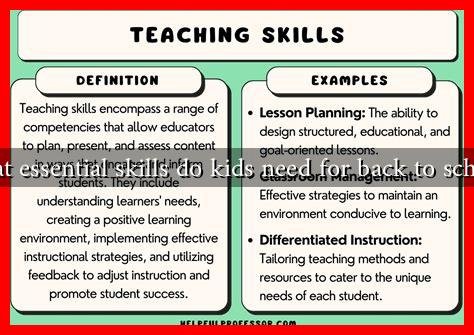-
Table of Contents
What Essential Skills Do Kids Need for Back to School?
As the summer break comes to an end, parents and educators alike begin to prepare for the new school year. While academic readiness is crucial, it’s equally important to equip children with essential skills that will help them thrive in a school environment. This article explores the key skills children need to succeed as they head back to school, providing insights and practical tips for parents and educators.
1. Time Management Skills
Time management is a critical skill that helps children balance their academic responsibilities with extracurricular activities and personal time. Teaching kids how to prioritize tasks and manage their schedules can significantly reduce stress and improve their productivity.
- Use of Planners: Encourage children to use planners or digital calendars to keep track of assignments, tests, and activities.
- Setting Goals: Help them set short-term and long-term goals, breaking larger tasks into manageable steps.
- Routine Establishment: Establishing a daily routine can help children allocate time effectively for homework, chores, and leisure.
According to a study by the American Psychological Association, children who develop time management skills early on tend to perform better academically and experience less anxiety related to schoolwork.
2. Communication Skills
Effective communication is vital for children to express their thoughts, ask questions, and collaborate with peers. Strong communication skills can enhance their learning experience and foster positive relationships with teachers and classmates.
- Active Listening: Teach children the importance of listening attentively and responding appropriately in conversations.
- Verbal Expression: Encourage them to articulate their ideas clearly and confidently, whether in class discussions or group projects.
- Non-Verbal Communication: Help them understand the significance of body language, eye contact, and facial expressions in conveying messages.
Research from the National Association of School Psychologists indicates that students with strong communication skills are more likely to engage in classroom discussions and collaborate effectively with peers.
3. Problem-Solving Skills
Problem-solving skills are essential for academic success and everyday life. Children who can think critically and creatively are better equipped to tackle challenges and make informed decisions.
- Encouraging Curiosity: Foster a sense of curiosity by encouraging children to ask questions and explore different solutions to problems.
- Real-Life Scenarios: Use real-life situations to teach problem-solving, such as planning a family outing or budgeting for a school project.
- Collaborative Learning: Promote group activities that require teamwork and collective problem-solving, enhancing their ability to work with others.
A study published in the Journal of Educational Psychology found that students who engage in problem-solving activities show improved academic performance and greater resilience in facing challenges.
4. Social Skills
Social skills are crucial for building friendships and navigating the complexities of school life. Children with strong social skills are more likely to feel comfortable in social settings and develop meaningful relationships.
- Empathy Development: Teach children to understand and respect others’ feelings, fostering a sense of empathy.
- Conflict Resolution: Equip them with strategies to resolve conflicts peacefully and constructively.
- Teamwork: Encourage participation in team sports or group activities to enhance their ability to work collaboratively.
According to a report by the Collaborative for Academic, Social, and Emotional Learning (CASEL), students with strong social skills are more likely to succeed academically and socially.
5. Self-Regulation Skills
Self-regulation involves managing emotions, behaviors, and thoughts in pursuit of long-term goals. Teaching children self-regulation can help them cope with stress and maintain focus in a school environment.
- Mindfulness Practices: Introduce mindfulness techniques, such as deep breathing or meditation, to help children manage stress.
- Goal Setting: Encourage them to set personal goals and reflect on their progress regularly.
- Emotional Awareness: Help children identify and express their emotions in healthy ways.
A study from the University of Illinois found that children who practice self-regulation are more likely to achieve academic success and develop positive relationships with peers.
Conclusion
As children prepare to return to school, equipping them with essential skills is just as important as ensuring they have the right school supplies. Time management, communication, problem-solving, social skills, and self-regulation are foundational skills that will not only enhance their academic performance but also prepare them for future challenges. By fostering these skills at home and in school, parents and educators can help children navigate their educational journey with confidence and resilience.
For more resources on developing these essential skills, consider visiting Edutopia, which offers a wealth of information on educational strategies and child development.





